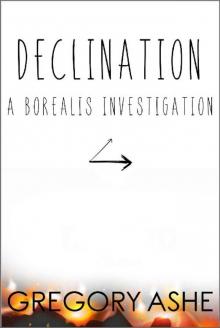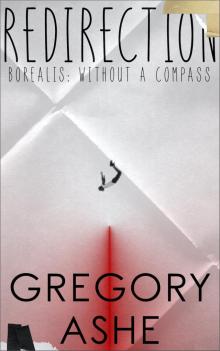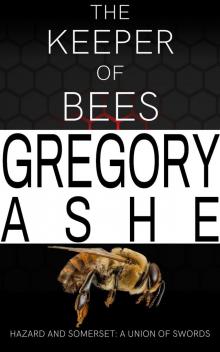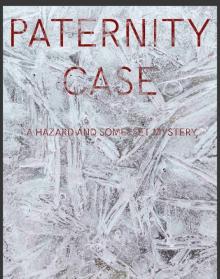- Home
- Gregory Ashe
Redirection Page 10
Redirection Read online
Page 10
“Do you have their address?”
“Yeah, I’ll text it to you. But I don’t think she’ll talk to you.”
“We’ll see. You said you thought there were plenty of people who’d want to kill Rik and pin it on you. What were you talking about?”
“Oh.” Tucker rubbed his jaw. “Shit. This is kind of embarrassing.”
“More embarrassing than revealing an entire marriage’s worth of infidelities, of which you kept extensive photographic record?”
“Uh. No. Well, maybe.”
“Christ.”
“So, the first time, I swear to God, I didn’t know what I was doing.”
“Virgin Confessionals: The Tucker Laguerre story.”
Tucker surprised North by laughing. “God, you are even more of a kid now that you’re with Shaw. You realize that, right?”
“We’re not together.”
“Please. As someone who has fucked up a lot of relationships in his life, I feel qualified to tell the difference between a couple that’s on the rocks and a couple that is finished. You guys are on the rocks. You’ll figure it out. You’ll patch things up.”
North rolled a finger. “Get back to the story.”
“Right. Well, Rik came to me with this phenomenal tip. A new cryptocurrency that was about to explode. He’d made a ton of money in cryptos up in Chicago. I knew he knew what he was talking about. The only thing that was kind of weird was that he kept saying that if I wanted to make any of my friends rich, now was the time to tell them to get in. He kept saying that.”
“And that’s weird?”
“Kind of. Usually people like to keep that kind of thing quiet. Restricted to a small group. It sounded like insider trading, and that’s definitely something you don’t want people talking about. I said something along those lines, because Rik wouldn’t let up, and he promised it was nothing like that.”
“Just the tip,” North suggested.
Tucker rolled his eyes and grinned. “Yeah, dummy, something like that. Anyway, I told some friends. I said to keep it quiet. And, believe it or not, they couldn’t keep a secret. A couple days later I got a call from Rik telling me to sell, so I sold.”
“And?”
“Remember those two weeks on Maui? I told you I got a good bonus?”
“Jesus, Tucker.”
“Yeah, well, I knew there was something shady about it, and I knew you’d ask a lot of questions, and we had a lot of fun on that trip, right?”
“Let me guess: Rik came back with another tip.”
“Not exactly. He came down to St. Louis to visit, and he told me what he was doing. You ever heard of pump-and-dumps?”
“They sound like a bad high school hand job. Is that what they are?”
“I know I already said this once, but this whole teenage humor thing, it’s definitely more pronounced now that—”
“What is a pump-and-dump, Tucker? Let’s hurry this the fuck along.”
“People have a million different ways of doing it: chat rooms, flyers, fake investment prospectuses, fake leaked documents, or good old-fashioned word of mouth. It all comes down to the same thing. You get a bunch of people to start buying a stock, for example. In this case, it was a cryptocurrency, but same idea. The price goes up. You sell before any of the chumps do, and you make a killing. Then, most of the time, the price drops, but it doesn’t matter.”
“Because you already got yours.”
“Pretty much.”
“That sounds illegal. And definitely unethical.”
Tucker shrugged.
“How many times did you do this?”
“Three or four.”
“Christ.” North rubbed his jaw. “Which is it?”
“Uh, four.”
“For fuck’s sake, Tucker. We didn’t need the money.”
“Right, well, easy for you to say since you weren’t earning any of it.”
“Fuck you.”
“I’m right, though, aren’t I? What you bring home from Borealis, I’m surprised you can afford your rent, let alone the GTO. Do you eat ramen every night?”
“We’re doing a lot better. Like I told you we would. All those times I told you that if you’d be patient, the business would take off. We’re doing great now.”
Tucker opened his mouth, then he swallowed whatever he’d been about to say. He nodded. “That’s… good. I’m proud of you.”
“Jesus.”
“Well, I’m trying not to be reactive, North. It’s not easy with you. You still know how to push all my buttons.”
“Somebody caught up in one of these pump-and-dumps,” North said. “How much money would they lose?”
“It depends on how greedy they were.”
North crossed his arms.
“I don’t know, Mick. If they put in a lot of money, especially at the end, and then sold too late, they could have lost a lot. If they bought in early and sold before the price bottomed out, they still might have made a little, but not as much as they hoped.”
“But in theory, someone could have lost everything.”
Another shrug.
“That sounds like a motive to kill. And if they knew you were involved, a motive to hang the frame on you.”
“Yeah, about that.” Tucker shifted in his seat, glancing over his shoulder and out into the backyard. “I may have, um, talked the cryptos up to some of our friends.”
On the deck outside, a sparrow fluttered down to peck at something it thought was food. It took off again in a disappointed flurry of wings. Sunlight through the tall mix of elm and sycamore dappled the patio, incandescent on the silver sage that grew between the pavers.
“Only that first time! I swear to God.”
“You are a real piece of shit.”
“I didn’t know what he was doing. I wouldn’t have gotten them involved if I had.”
“Who?”
“Peter and Paul for sure. They weren’t happy, but I don’t think they thought I was responsible. Maybe Percy, but he plays his cards close to his chest. I floated it once, later, to try to feel him out, but he wouldn’t bite.”
North grunted. “I’m surprised Shaw didn’t sign over his bank account. He would have been all over something like this.”
“I did ask him, but that was right when he decided to build a Strawberry Shortcake portfolio, and yeah, that’s exactly what it sounds like. He told me his money was all tied up.”
“For the love of God.” North thought for a moment. “Are you trying to tell me that our friends, the ones we’ve known since freshman year, might have murdered Rik and framed you because of a bad investment?”
“Peter and Paul lost a lot of money. I don’t know how much, but they’ve got more money than God, so if they were upset about the investment, it means something serious.”
“Peter and Paul wear matching sweater vests, and the only argument I’ve ever seen them have was five seconds of bickering about whose Botanical Garden membership they should use for admission.”
“Yeah, well.” With a weird laugh, Tucker waved a hand at the air between them. “Things aren’t always what they seem.”
The air conditioning kicked on again. Eddies of fingerprint powder drifted along every surface.
“Someone has been following me,” Tucker said.
“What? And you waited until now to say something?”
“I just remembered. I mean, I’m not even sure someone really was following me. But I think someone was. I’d see this old Ford all over the place, and then I wouldn’t see it, and I’d convince myself it was all my imagination.”
“What color?”
“Brown. Why?”
“You never saw the driver?”
“No. Why? Did you see it?”
“When did you start noticing it?”
“I don’t know. North, if you saw it, then that means I’m not crazy. Where did you see it? Do you know who it belongs to?”
“What the fuck do you mean, you don’t know when you started noticing it? You have to know—”
“A few weeks ago! I don’t know! One day I finally thought, ‘Hey, I think I’ve seen that car before,’ but I don’t know if that was the second time I saw it or the fifteenth or the hundredth. I mean, I don’t know. Where did you see it? Were they following me the night of the murder?”
“The less you know right now, the better.”
Tucker made a frustrated noise, scowled, and peered at North, as though suspecting a trick or a joke.
North kept his smile on the inside. Sometimes, in married life, it was the little things.
“Did you find the Beamer’s spare fob?”
“What? Oh. No. God, I got here right before you did. Come upstairs; we’ll check.”
“I’ll stay here.”
“Mickey.”
“Hurry up. Your dad is paying me by the hour.”
Tucker’s steps rang out on the stairs, and a couple of minutes later he was back, shaking his head.
“You’re sure?”
“It’s gone. Maybe the police—”
“I don’t think so; they’ve still got your keys. How long has it been missing?”
“Oh my God, come on, how am I supposed to know that?”
“The break-in was a couple of weeks ago?”
Tucker nodded.
“Let’s assume that’s when the fob was taken. Did he take your driver that day?”
“I already told you—”
“Yeah, I heard your sob story: you’re depressed, it’s affecting your life, you haven’t been golfing.”
“I haven’t been golfing. And I am depressed. God, is that so hard to believe?”
“That’s why you’ve got those Viagra in the car? Can’t get it up?”
Tucker put his face in his hands. His shoulders slumped. “I’ve tried,” he said in a quiet voice. “Today. With you. I don’t know why you can’t meet me halfway. And now—yeah, North, that’s why. And this is about as fucking awful as I thought it’d feel.” He got to his feet, dropping his hands. “Why don’t you leave, North? I’ve got stuff I need to do.”
“Don’t give me the hurt-feelings routine.”
“My feelings are hurt. And I’m…I’m humiliated. And I’m tired. So go away.”
“Are you fucking kidding me? It was a dumb crack, and because you can’t take a joke—”
“I’m tired of jokes. And I’m tired of you being mean to me. You know what, North? I know I did some awful things to you. If this is what’s going to help you heal and get better, then yeah, I’ll sit here and take it. But I don’t think that’s what this is about. This is you being avoidant again, trying not to have to deal with the fact that I’ve changed, and I want to make things right between us, and all you want to do is run and run and run and hide behind your jokes.”
“You can’t fix things, dumbshit. Whatever we had? That’s gone. It’s not coming back. And you can’t fix people, Tuck. And you can’t change people. And you can’t change relationships. People are who they are. And they either work together or they don’t. And you? You’re fucking toxic.”
“I’m sorry you feel that way. I’m not going to let your negative attitude mess up the work I’m doing—”
Coming unhinged was a good term for it. It was like something slipped, a pin got knocked loose, and North suddenly wasn’t in control anymore. He was just watching from the back seat.
He crossed to a wall where several framed pictures of them still hung. He grabbed one of the bigger ones, a print from a photo shoot Tucker had insisted they do on his twenty-fifth birthday. They were sitting on a rock together. In the blurry background, a creek traced its way across a swath of prairie.
North threw it down. Glass shattered. Tucker cut off whatever he’d been saying.
“Fix that,” North said.
“Are you out of your mind?”
North grabbed another picture from the wall. Them in Maui. A trip he’d bought by ripping off their friends.
“North McKinney, don’t you dare—”
It crashed against the floor. Shards of glass spun across the tile like the first ice of winter.
“And fix that.”
“Stop it! What the hell is wrong with you?”
North grabbed another, not looking at what it was, and hurled it down. “And that.” Another. “And that.” Another. “And—”
Tucker caught his wrist, and for a moment they struggled. They were close to the same height, but North was built heavier, with more muscle, and after a moment, he wrenched himself free of Tucker’s grip. He used both hands to swing the picture down and release it at the last moment. Glass tinkled. The frame splintered, a length of wood popping free so the whole thing was cockeyed.
“You fucking idiot,” Tucker snarled. “You want to throw a tantrum? I’ll show you a tantrum?” He brought back a hand for one of the heavy, open-handed blows he always liked to start with. Because they weren’t hard enough to do real damage. Because they were humiliating.
North flinched.
Tucker froze.
Stumbling back, North tried for a smirk, but his face felt frozen. Glass slid underfoot. The larger pieces crunched.
“Look how much you’ve changed,” North said. He meant the words to be quiet and controlled. They were too loud. He couldn’t seem to slow his breathing.
The front door opened, and Shaw’s voice echoed against the high ceiling, filling the silence. “They didn’t have the meatball sandwich you said North liked, so I got—what happened?”
Tucker shifted his weight. He wouldn’t meet North’s eyes. A piece of glass tumbled free somewhere and clinked against the tile.
“North, what—”
North headed for the open front door, the wet summer heat, the smell of mulch burn like silage. Shaw trailed him, talking, but the words were meaningless. North got to the GTO’s passenger door and flung it open.
“I need you to drive.”
“Yeah, of course, but where—”
“Anywhere.”
Chapter 10
THE WEBSTER GROVES SCULPTURE park was a testament to the little suburb’s quirks. A rusted-wire tower that had probably once been designed for tomatoes or some sort of climbing plant now supported enormous aluminum feathers that spun when the hot, heavy air stirred. A massive mosaic sculpture of a bluebird watched passersby with glittering eyes. One of the pieces, an oxidized sheet of iron with a perfectly round hole in it, above which was suspended a sharply angular length of steel, reminded North ominously of a guillotine. Or maybe that was the panic attack talking.
Shaw parked in the shade of an old oak. “What can I—”
“Don’t talk.” North wet his lips. In a softer voice, he added, “Please.”
He leaned forward, head in his hands. Shaw rolled the windows down and killed the engine. Midwestern summer fell across North like a wet, hot blanket. He closed his eyes so tightly that color flashed in the darkness. He made himself focus: the stickiness of his skin, the cotton clinging to his back, the thickly sweet smell from the honeysuckle. But part of him kept coming detached from the moment, and that part of him kept replaying the fight with Tucker, kept adding to it, building it out in a hundred different versions. In some of them, Tucker carried through with the blow. In some of them, North fought back. In some of them, he did what he’d done so many times: tried to defuse, tried to get away, used his hands and arms as a shield for his face because he knew he could wear long sleeves.
When Shaw touched his shoulder, he let out a high-pitched breath and pressed his hands down tighter.
“North—”
“I’m fine.” He made himself sit up. He forced himself to peel his fingers away. “Ok. We need to go to Rik and Jean’s place. Can you drive?” He let out a noise that he wanted to sound like a laugh. “I think my blood sugar really is low because I’m feeling a little wobbly.”
> “North—”
“You’ve got the address, right?”
The question was so many questions wrapped into one, all the ways North knew to say please, the closest he could come to begging Shaw to leave this alone.
After a moment, Shaw redid his bun and said, “Yeah, I’ve got it.”
“Ok,” North said, and the word meant thank you.
Then Shaw leaned across the seats and wrapped North in a hug. North shook once, pressing his face into Shaw’s neck, clinging on to his self-control by his fingernails. The hug was perfect: tight and warm and strong, without being overbearing, without any demands. Shaw released him, dropping back into his seat, and said, “Turkey club and those salt-and-vinegar chips are in that bag.”
They were merging onto I-44 when North trusted himself to say, “Thanks.”
“That’s what I’m here for,” Shaw said with a goofy grin. He then proceeded to hold a one-sided conversation that lasted for the entire drive on the subject of creating my bliss, which apparently involved vision boards and North learning to clog.
Rik and Jean Slooves lived in a Ladue house not far from Dick and Cathy Laguerre. It had a large lot, leafy with maples, that was cleft by a teardrop driveway. The house itself was brick painted white, gabled, with shutters a French country blue. Large picture windows seemed to open every room, all of them with curtains drawn back. At night, aglow, it must have looked like a storybook home. Mid-afternoon on a July day, it looked like well over a million dollars.
North had devoured the club and the chips. He’d drunk the bottled water. Shaw had nibbled on some sort of veggie wrap, and when he didn’t finish it, North ate the rest of that too. He was polishing off Shaw’s Sun Chips when Shaw parked at the fat end of the teardrop. The food had helped. Shaw’s patter had helped more.
Jean answered the door in a terrycloth bathrobe. North had seen her only once, at Teddi’s party, and then only at a distance. Up close, he was struck by her height—she was almost as tall as he was, her features broad and unpadded, softened only by the way she held herself and by the intensity of her eyes. When she spoke, he remembered she was from Cameroon; she had vowels like Edith Piaf.

 Declination
Declination Redirection
Redirection Fold Thunder
Fold Thunder Hazard and Somerset
Hazard and Somerset Police Brutality (Hazard and Somerset: A Union of Swords Book 2)
Police Brutality (Hazard and Somerset: A Union of Swords Book 2) Wayward
Wayward The Same End (The Lamb and the Lion Book 3)
The Same End (The Lamb and the Lion Book 3) The Dew of Flesh
The Dew of Flesh The Same End
The Same End The Keeper of Bees ARC
The Keeper of Bees ARC Orientation (Borealis Investigations Book 1)
Orientation (Borealis Investigations Book 1) The Indifferent Children of the Earth
The Indifferent Children of the Earth The Mortal Sleep (Hollow Folk Book 4)
The Mortal Sleep (Hollow Folk Book 4) The Rational Faculty (Hazard and Somerset: A Union of Swords Book 1)
The Rational Faculty (Hazard and Somerset: A Union of Swords Book 1) The Weeping Lore (Witte & Co. Investigations Book 1)
The Weeping Lore (Witte & Co. Investigations Book 1) Pretty Pretty Boys
Pretty Pretty Boys Transposition
Transposition Paternity Case
Paternity Case